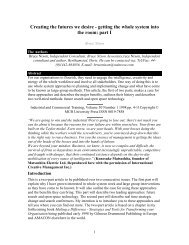From Old Economics to New Economics- Radical ... - Bruce Nixon
From Old Economics to New Economics- Radical ... - Bruce Nixon
From Old Economics to New Economics- Radical ... - Bruce Nixon
Create successful ePaper yourself
Turn your PDF publications into a flip-book with our unique Google optimized e-Paper software.
“…only the consumption benefit of income remains at the aggregate level. Since the consumption<br />
benefit approaches zero as income rises, happiness profiles over time in developed countries are flat.” 2<br />
So our lifestyles in developed countries do not increase our well-being as a nation, but they<br />
are increasingly leading <strong>to</strong> devastating environmental consequences around the globe.<br />
These impacts are multi-faceted and inextricably interconnected. For example, in the last half<br />
century, human beings have changed the planet’s ecosystems with a speed and depth which is<br />
his<strong>to</strong>rically unprecedented. 3<br />
Chart 1.2. Global Population Growth 1750-2000 (forecast <strong>to</strong> 2150)<br />
10000<br />
9000<br />
8000<br />
7000<br />
6000<br />
Millions<br />
5000<br />
4000<br />
3000<br />
2000<br />
1000<br />
0<br />
1750 1800 1850 1900 1950 2000 2050 2150<br />
Source: UN (2000)<br />
These impacts are strongly related <strong>to</strong> the rapid global population growth that we have seen<br />
over the same period, with <strong>to</strong>tal global population more than doubling in the second half of<br />
the twentieth century, as can be seen from chart 1.2. The chart also shows that global<br />
population is forecast <strong>to</strong> increase by a further two thirds between 2000 and 2150. If we persist<br />
with our current economic model, the consequences for our natural ecosystems will be<br />
catastrophic.<br />
The population growth we have seen has obviously increased the demand for food and water<br />
in the last half century, but our greatly increased economic activity (i.e. per capita economic<br />
activity) has exacerbated these impacts: 4<br />
• More land was converted <strong>to</strong> cropland across the world during the thirty years from<br />
1950 <strong>to</strong> 1980 than between 1700 <strong>to</strong> 1850.<br />
• Food production has more than doubled since 1960.<br />
• The quantity of water taken from rivers and lakes has doubled since 1960.<br />
• Since 1960, wood taken for pulp and paper production has tripled and timber<br />
production increased by more than half.<br />
2 Clarke et al (2007: 53)<br />
3 See the Millennium Ecosystems Assessment (2005) for a comprehensive review of the impact of<br />
human activity on natural ecosystems.<br />
4 Millennium Ecosystems Assessment (2005)<br />
5



